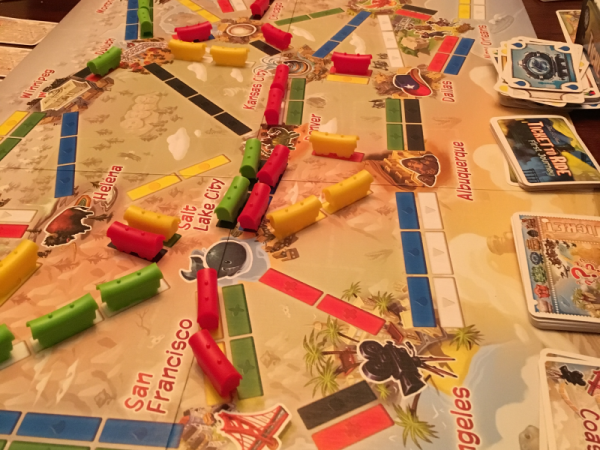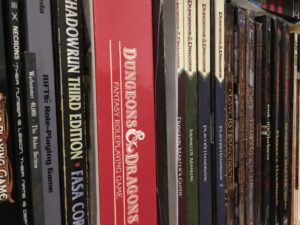You like to plan your stories. Write detailed outlines and character backgrounds and wikis for your setting with reference photos where appropriate. Answer hundreds of questions that may never be addressed in your book. Maybe you even craft in-world songs and stories, sometimes in languages you’ve invented. Before you ever type the words “Chapter One,” you’ve prepared more than some people actually work on a single project.
Pantsing? Hell no. You would never. You’re an architect, not a gardener!
But what do you do when your plans fail? What happens when you hit a roadblock or traffic jam on your carefully planned route? What if you find yourself getting bored and wondering how to reignite the spark you’ve lost? Or glancing at other paths, their mysterious attractions and sideshows shimmering with potential?
That, amigos, is when you take a page from those pantsers you previously scorned.
If you’re a plotter and you’ve gotten mired or disinterested or frustrated by your story, or you’ve hit on something you didn’t plan for and are scrambling to keep your momentum going, here are some options cribbed from folks who are more comfortable with flying by the seat of, well, you know.
You’ll notice that the key to a lot of these approaches is randomness. Having some external input from outside your own mind works well because humans are naturally pretty good at finding patterns and coming up with ways to integrate new knowledge. Being given some random thing to incorporate into your story is like sticking a piece of grit in an oyster; your brain tends to start working to turn that sucker into a pearl, assuming it doesn’t spit it out immediately. Or it can be like finding a strange puzzle piece, and your imagination perks up and tries to reconstruct more of the picture from that small fragment.
Use random generators.
Websites like Seventh Sanctum or Fantasy Name Generators have dozens, even hundreds of different random generators for everything from character names to magic potion descriptions to fake history book titles. If you’re stuck and need to come up with something on the fly, a random generator can give you a useful placeholder. Or if your brain has taken a temporary vacation and you’re hoping to lure it back, a generator can jump start your imagination and suggest options that lead you to whatever ends up working. Beyond internet options, there are products you can buy like story dice or cards, which tend to be more vague and generalized but offer similar randomized input scenarios.
Take suggestions or dares from family, friends or people on social media.
If you’ve ever been to an improv show, you know most scenes start with the performers asking you to give them a word or a phrase, maybe something more specific like a non-romantic relationship or an object you’d find in your house. You don’t have to give any context for your question, either; in improv, the suggestion inspires the scene, so there’s no need to launch into an explanation about your story and how you’re stuck and why. But don’t be afraid to ask for outside input from your fellow humanoids and see how you can make those ideas work with what you’ve already written or were planning to write. Sometimes it gets lonely in your head, and adding a few extra voices turns an echo chamber into harmony.
Go for a walk/ride and write about anything you see.
This won’t work if the weather is trash, or if your area isn’t accessible, or if you literally can’t move for some reason, but getting outside or simply switching up your location can give you fodder for characters, descriptions, and so on. Look for stuff you can integrate into a current or future scene. What specific sensory details can you pull from your surroundings? What patterns of speech or quirky appearances? What strange smells and dissonant sounds? If you’re stuck in one spot, open Pinterest and type in a general location, like “desert” or “coffee shop” or “hot spring,” and see what images come up. If you’re stuck and you don’t have internet access, then…
Look around you: pick an object and add it to the story.
Objects in stories can function as gravity wells, adding weight to a scene or setting. They can be motifs that repeat to give the reader anchor points, or to accumulate emotions like snowballs rolling downhill and gathering snow. They can add depth to a character, convey theme, flesh out back story, all sorts of useful stuff. Maybe your original plans didn’t include any particular objects that might be associated with a person or place or theme, but nothing is stopping you from grabbing some random item off a shelf and imbuing it with meaning. It doesn’t have to be something unique or strange, either; a perfectly ordinary thing can take on extraordinary proportions when used properly.
Tell a story within the story.
Maybe it’s a flashback, or an origin myth, or a morality tale. Maybe it’s a parent embarrassing their child, or a villain revealing their tragic origins. Maybe it’s a newspaper article or eyewitness account of an event that occurred beyond the point of view of your characters. If you deploy this trick carefully, you can do some neat world or character building, or even slide in some important plot information in a more entertaining way than a straight infodump or “as you know, Bob” conversation. Use sparingly, or make it a feature of your particular structure and apply liberally.
Add a new character.
Whether it’s some minor annoyance or a major antagonist suddenly busting in like the Kool-Aid Man, throwing a new character into your mix can turn a linear narrative into a frantic bee dance. Who are they? What do they want? How do they know your other characters? Are they here to help or hinder? Will they come back later or are they only here for a single scene? Are they just really sad about their cabbages constantly being destroyed?! It’s up to you! Make them as odd or enticing or disruptive as you like.
What’s the worst thing that could happen? IT HAPPENS!
Whether you suddenly don’t know what comes next, or your previously planned plot feels lackluster now that you’re writing it, you can always default to asking an operative question. Which question you want to ask depends on the kind of story you’re telling. Instead of figuring out the worst thing that could happen, maybe instead you should come up with the funniest, or strangest, or sexiest, or saddest. Regardless, whatever you choose should probably make your character’s life harder somehow, their goals more unattainable, their present or future situation more complicated. Raise the stakes. Brainstorm without rejecting any options; you can pick and choose later. Push past the obvious first choice and find secret options X, Y and Z.
Be receptive.
This may sound vague, but it’s an essential skill to cultivate, and one that pantsers often have naturally. As you work, your brain is probably doing a lot more subconsciously than you realize, whether it’s forming connections or drawing out themes or supplying character details you hadn’t considered before. A closed mind will reject new ideas or changes to old ideas, which shuts down your inspiration factory and keeps it from producing to its full potential. An open mind will accept ideas without judgment, then consider and integrate the cool things and gently discard the rest. The more receptive you are, the more of that background processing your brain will do, and the more it will produce either on demand or as sweet bonus material when you least expect it.
When in doubt, write it out.
Plotters may be nauseated by the prospect of (gasp) wasting time and words on the wrong choice or scene or whatever, but sometimes you have to do something the “wrong” way to figure out what the right way looks like. No writing is ever truly wasted, in the same way that experiments don’t fail, they simply prove or disprove hypotheses. And even if a particular approach is wrong for this story, there may be some core element that can be scavenged for another tale in the future. If nothing else, you’ve practiced your craft, and that’s always intrinsically useful.
Part of the sweet joy of pantsing is chasing the rush of the surprising, the unexpected, the flashes of unanticipated and unpremeditated brilliance like lightning or rainbows on a clear day. It’s the thrill of discovery, uncovering the unknown and bringing it back to show others. Sometimes plotters concentrate so hard on the road that they forget to look at their surroundings; they focus on the destination and miss out on unforeseen adventures along the way. Don’t be afraid to occasionally succumb to spontaneity! Life rarely goes according to plan, so why should your story?
#
Special thanks to Jeffe Kennedy for the idea of putting this together, and to Jay, Cee, Chelsea, Amanda, Mary, Maureen and Jo for input and support.




